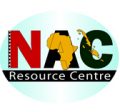Echoes of the Benin Kingdom / British Conflict of 1897 – Research Project
Benin Kingdom/British Conflict of 1897 – Impact on present-day Socio-cultural dimensions
A Brief History of Benin Kingdom (Nigeria)
Echoes of the Benin Kingdom / British Conflict of 1897
The image below is of the Benin looters
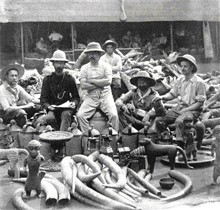
Benin Kingdom is one of the most well known and respected in Africa, with an established tradition of Art that is unique and recognised worldwide. The Kingdom of Benin is one of the most sophisticated in Africa, with a tradition of art that is famous for its refinement and beauty.
This research project focuses on exploring the events of the Benin Kingdom/British Conflict in 1897 and the culture and art forms that come from this part of West Africa.
The art of the Benin Kingdom first came to the attention of Europeans in 1897 when members of a British Naval Expedition brought out thousands of objects as war booty. Through Government and Private sales, Benin Sculpture, Plaques and other Objects soon found its way into the British Museum and personal collections in England, Europe, and America.
The British conquest of Benin Kingdom in 1897 resulted not only in the dispersal of art, but also considerable changes in the fabric of Benin life. Once an independent warrior Kingdom, Benin was then incorporated into the wider political framework of the British Protectorate of Nigeria and later the modern Nigerian State. Today Benin City, a thriving metropolis of over 400,000 people, is the capital of the Edo State of Nigeria.
The research project will cover a range of educational aspects of Benin cultural history; the traditions and beliefs, including the artefacts, their origin and interpretation, and their continuing relevance in the 21st Century.
Outline of the ‘Echoes of Benin Kingdom/British Conflict 1897’ Research Project
The project will aim to research the historical perspectives of the Benin Kingdom/British Conflict of 1897 noting it’s impact on its present-day Socio-Cultural dimensions. The research will culminate into the production of resource materials in the form of a new Website, DVD’s and Booklets.
The project will provide new learning opportunities to local people (of various age-ranges) and provide them with volunteering opportunities to enable them to take an active role in the project. Local people in Newham will have an opportunity to attend Exhibitions, Workshops, Seminars and Coach Trips to the British Museum. Participants from different ethnic backgrounds living in Newham and other parts of London will be provided with new opportunities to learn about Benin History, Arts and Culture.
The participants will also learn that the ‘Oba’ (King of Benin) until the late 19th Century was the traditional leader of one of the major powers in West Africa. Following the 1897 war, the ‘Oba’ of Benin was captured and sent to exile in Calabar (Southern Nigeria) where he was later presumed to have died. The participants will also learn how the Oba’s Palace was destroyed and large quantities of Sculpture and Regalia, including the works in Wood, Ivory and especially Brass Plaques were taken.
Project delivery
This project is being delivered by the Newham African Caribbean Resource Centre (NACRC) who received a grant award of £49,926 from the Heritage Lottery Fund. Newham African Caribbean Resource Centre is being supported by several different partner organisations to deliver this project.
The British Museum will be involved in the facilitation of the workshops and trips to their Benin Art Collections and African Galleries. Aston Mansfield (Community Involvement Unit) a large charity organisation based in East London will be involved in organising the Exhibitions and training programme for 24 Volunteers.
The project is funded by the Heritage Lottery Fund until December 2012.
Other partner organisations include Rights and Equalities in Newham (REIN), African Youth Organisation (AYO) and Benin Union Trust. The project is also being supported by various prominent Benin Historians, the ‘Oba’s’ Representative in the United Kingdom and Newham Council.
The Project Co-ordinators were Dr. Samuel Egharevba and Mr. Dennis Mensah who were initially assisted by 24 volunteers. This number had swollen to more than 50 by the end of the project.
Cultural Diversity in the Context of Social Cohesion.
The project involved people from different communities within the London Borough of Newham. Initially there were 24 Volunteers which had increased to more than 50 by the end of the project who attended Workshops, Seminars and Exhibitions. These were supported by a diverse range of organisations.
Our volunteers came from diverse cultural backgrounds, including West African, East African, Central African, Caribbean, British, Jewish, Eastern European, Irish and Asian.
Aims & Objectives
Project Title: Echoes of the Benin Kingdom / British Conflict of 1897
What the heritage project focused on and why was it important?
The collection / collation of historical data to create awareness of and advance public education in Benin History, Arts and Culture (from the ancient Benin Kingdom) through Exhibition of historical arts, artefacts – clay pots, bronze, carvings, and archival war materials.
Others included historical accounts of the Benin Massacre during the Benin / British Conflict in 1897, lectures, workshops and demonstrations in Benin music and Dance.
What are the aims of this project?
The project’s aim was to research the historical perspectives of the Benin / British conflict, noting its impact on its present-day socio – cultural dimensions. The research culminated in the production of resource materials in the form of DVDs, booklet and a website.
To foster mutual respect in relation to culture and to enable the growth of racial harmony within the society by helping people to learn about their own and other people’s heritage; preserve people’s memories and experiences, including cultural traditions that will pass down through our youths and generations to come.
- Promote learning and participation on Benin Cultural History.
- To encourage young people to learn about Benin (West African) History.
- To promote and advance education in Benin Arts and Culture (from the ancient Benin Kingdom) through exhibition of historical arts, artefacts-clay pots, bronze, and carvings.
Also to include historical accounts of the Benin Massacre during the Benin Kingdom/British Conflict in 1897.
- To foster mutual respect in relation to culture and to enable the growth of racial harmony within the society.
- To help build stronger relationships between the West African and British Communities in the United Kingdom.
- To encourage active participation by Volunteers, residents, partner organisations and other attendees during the Workshops, Exhibitions and Coach Trips to the British Museum.
Planned activities.
These included a series of cultural events /exhibitions / workshops and lectures / collections of archival materials that brought people of diverse cultures together – intended to enlighten, inform and entertain the public about Benin History, Arts and culture.
We conducted research which included interviews covering the following subjects:
- Historical background of Benin Kingdom prior to 1897 (e.g. economic and military power). – trade and boundary? How far it stretched?
- What made the Benin Empire unique prior to 1897?
- What led to the conflict in 1897? (How did the conflict start / who started the conflict)?
- Historical accounts of the Benin Massacre during the Benin Kingdom / British Conflict in 1897. How long did the conflict last?
- Exploring the reasons why Benin Artefacts, Carvings and Bronze were taken by the British after the conflict? (were these artefacts documented and were they ever replicated until this day?) Including the history of the bronze casting and importance in Benin culture.
- Explored the reasons why the ‘Oba’s’ Palace was destroyed and why the Oba was captured and sent to exile in Calabar (Southern Nigeria).
- Post war post-mortem – Impact of the war on the Benin Kingdom / Culture – socio-economic, political and demographics, etc.
- How the learning from the war was used to progress the Benin Culture, e.g. in the short/medium term? Infrastructural improvements – road network, social amenities, did it bring about advancement in education & health- e.g. build schools & hospitals, public administration, etc, in trade, in technical development, improved farming / agriculture?
- Benin Kingdom today – has it advanced tourism, or is improvement needed in this aspect? Did the learning from the British dilute the tradition, if so, how?
Aims & Objectives and project progress report
About Us
Benin Kingdom/British Conflict of 1897 – Impact on present-day Socio-cultural dimensions
.
A Brief History of Benin Kingdom (Nigeria)
Echoes of the Benin Kingdom / British Conflict of 1897
The image below is of the Benin looters

Benin Kingdom is one of the most well known and respected in Africa, with an established tradition of Art that is unique and recognised worldwide. The Kingdom of Benin is one of the most sophisticated in Africa, with a tradition of art that is famous for its refinement and beauty.
This research project focuses on exploring the events of the Benin Kingdom/British Conflict in 1897 and the culture and art forms that come from this part of West Africa.
The art of the Benin Kingdom first came to the attention of Europeans in 1897 when members of a British Naval Expedition brought out thousands of objects as war booty. Through Government and Private sales, Benin Sculpture, Plaques and other Objects soon found its way into the British Museum and personal collections in England, Europe, and America.
The British conquest of Benin Kingdom in 1897 resulted not only in the dispersal of art, but also considerable changes in the fabric of Benin life. Once an independent warrior Kingdom, Benin was then incorporated into the wider political framework of the British Protectorate of Nigeria and later the modern Nigerian State. Today Benin City, a thriving metropolis of over 400,000 people, is the capital of the Edo State of Nigeria.
The research project will cover a range of educational aspects of Benin cultural history; the traditions and beliefs, including the artefacts, their origin and interpretation, and their continuing relevance in the 21st Century.
Outline of the ‘Echoes of Benin Kingdom/British Conflict 1897’ Research Project
The project will aim to research the historical perspectives of the Benin Kingdom/British Conflict of 1897 noting it’s impact on its present-day Socio-Cultural dimensions. The research will culminate into the production of resource materials in the form of a new Website, DVD’s and Booklets.
The project will provide new learning opportunities to local people (of various age-ranges) and provide them with volunteering opportunities to enable them to take an active role in the project. Local people in Newham will have an opportunity to attend Exhibitions, Workshops, Seminars and Coach Trips to the British Museum. Participants from different ethnic backgrounds living in Newham and other parts of London will be provided with new opportunities to learn about Benin History, Arts and Culture.
The participants will also learn that the ‘Oba’ (King of Benin) until the late 19th Century was the traditional leader of one of the major powers in West Africa. Following the 1897 war, the ‘Oba’ of Benin was captured and sent to exile in Calabar (Southern Nigeria) where he was later presumed to have died. The participants will also learn how the Oba’s Palace was destroyed and large quantities of Sculpture and Regalia, including the works in Wood, Ivory and especially Brass Plaques were taken.
Project delivery
This project is being delivered by the Newham African Caribbean Resource Centre (NACRC) who received a grant award of £49,926 from the Heritage Lottery Fund. Newham African Caribbean Resource Centre is being supported by several different partner organisations to deliver this project.
The British Museum will be involved in the facilitation of the workshops and trips to their Benin Art Collections and African Galleries. Aston Mansfield (Community Involvement Unit) a large charity organisation based in East London will be involved in organising the Exhibitions and training programme for 24 Volunteers.
The project is funded by the Heritage Lottery Fund until December 2012.
Other partner organisations include Rights and Equalities in Newham (REIN), African Youth Organisation (AYO) and Benin Union Trust. The project is also being supported by various prominent Benin Historians, the ‘Oba’s’ Representative in the United Kingdom and Newham Council.
The Project Co-ordinators were Dr. Samuel Egharevba and Mr. Dennis Mensah who were initially assisted by 24 volunteers. This number had swollen to more than 50 by the end of the project.
Cultural Diversity in the Context of Social Cohesion.
The project involved people from different communities within the London Borough of Newham. Initially there were 24 Volunteers which had increased to more than 50 by the end of the project who attended Workshops, Seminars and Exhibitions. These were supported by a diverse range of organisations.
Our volunteers came from diverse cultural backgrounds, including West African, East African, Central African, Caribbean, British, Jewish, Eastern European, Irish and Asian.
Aims & Objectives
Project Title: Echoes of the Benin Kingdom / British Conflict of 1897
What the heritage project focused on and why was it important?
The collection / collation of historical data to create awareness of and advance public education in Benin History, Arts and Culture (from the ancient Benin Kingdom) through Exhibition of historical arts, artefacts – clay pots, bronze, carvings, and archival war materials.
Others included historical accounts of the Benin Massacre during the Benin / British Conflict in 1897, lectures, workshops and demonstrations in Benin music and Dance.
What are the aims of this project?
The project’s aim was to research the historical perspectives of the Benin / British conflict, noting its impact on its present-day socio – cultural dimensions. The research culminated in the production of resource materials in the form of DVDs, booklet and a website.
To foster mutual respect in relation to culture and to enable the growth of racial harmony within the society by helping people to learn about their own and other people’s heritage; preserve people’s memories and experiences, including cultural traditions that will pass down through our youths and generations to come.
- Promote learning and participation on Benin Cultural History.
- To encourage young people to learn about Benin (West African) History.
- To promote and advance education in Benin Arts and Culture (from the ancient Benin Kingdom) through exhibition of historical arts, artefacts-clay pots, bronze, and carvings.
Also to include historical accounts of the Benin Massacre during the Benin Kingdom/British Conflict in 1897.
- To foster mutual respect in relation to culture and to enable the growth of racial harmony within the society.
- To help build stronger relationships between the West African and British Communities in the United Kingdom.
- To encourage active participation by Volunteers, residents, partner organisations and other attendees during the Workshops, Exhibitions and Coach Trips to the British Museum.
Planned activities.
These included a series of cultural events /exhibitions / workshops and lectures / collections of archival materials that brought people of diverse cultures together – intended to enlighten, inform and entertain the public about Benin History, Arts and culture.
We conducted research which included interviews covering the following subjects:
- Historical background of Benin Kingdom prior to 1897 (e.g. economic and military power). – trade and boundary? How far it stretched?
- What made the Benin Empire unique prior to 1897?
- What led to the conflict in 1897? (How did the conflict start / who started the conflict)?
- Historical accounts of the Benin Massacre during the Benin Kingdom / British Conflict in 1897. How long did the conflict last?
- Exploring the reasons why Benin Artefacts, Carvings and Bronze were taken by the British after the conflict? (were these artefacts documented and were they ever replicated until this day?) Including the history of the bronze casting and importance in Benin culture.
- Explored the reasons why the ‘Oba’s’ Palace was destroyed and why the Oba was captured and sent to exile in Calabar (Southern Nigeria).
- Post war post-mortem – Impact of the war on the Benin Kingdom / Culture – socio-economic, political and demographics, etc.
- How the learning from the war was used to progress the Benin Culture, e.g. in the short/medium term? Infrastructural improvements – road network, social amenities, did it bring about advancement in education & health- e.g. build schools & hospitals, public administration, etc, in trade, in technical development, improved farming / agriculture?
- Benin Kingdom today – has it advanced tourism, or is improvement needed in this aspect? Did the learning from the British dilute the tradition, if so, how?
Aims & Objectives – Project Progress Report
Project steering group and official launch
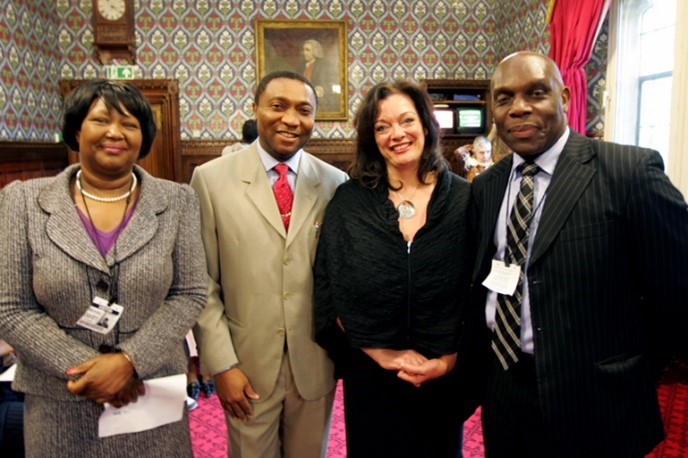
(Left to right) Cllr Joy Laguda, David Idiabana
(General Manager of NACRC) Lyn Brown (MP for West Ham), Vincent John (Chairman of NACRC)
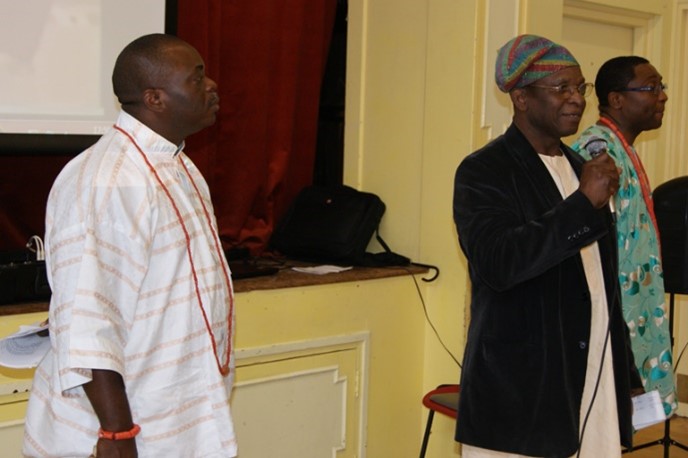
EXHIBITION AND WORKSHOPS SESSIONS FEATURED Professor C.O. IdehenAL;ONG WITH OTHER PROMINENT MEMBERS OF THE PROJECT TEAM.
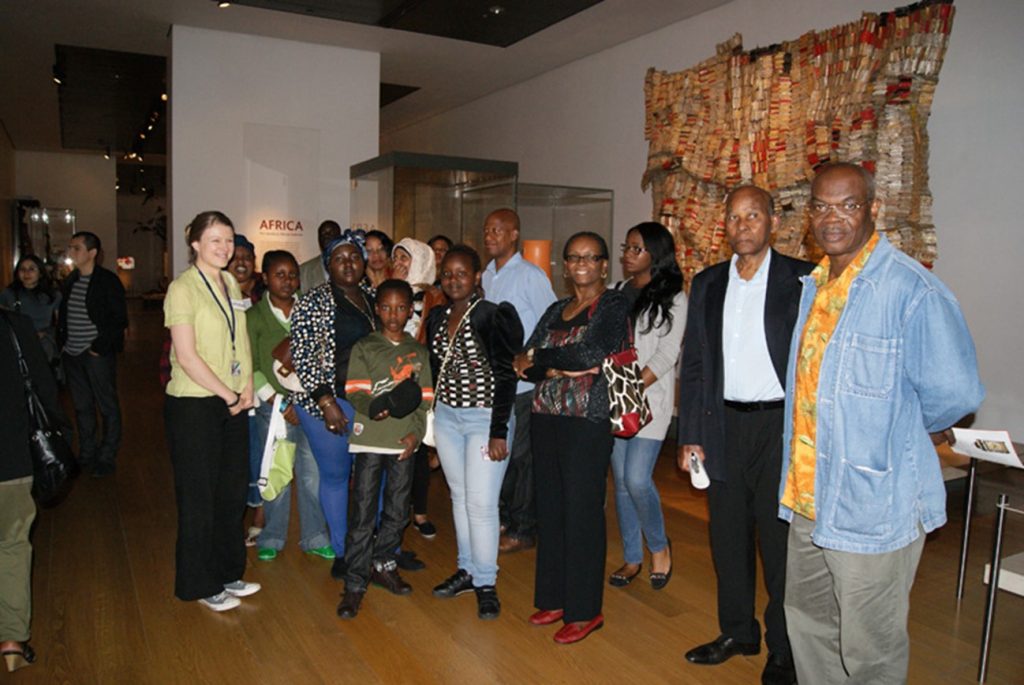
EDUCATIONAL TRIP TO THE BRITISH MUSEUM FEATURED THE The Curators Team with one of the workshop sessions.
What are the aims of this project?
The 7 members of the Project Steering Committee were appointed prior to the start of the project.
The Job advertisements for the two part-time posts of Project Co-ordinator and the Project Worker were advertised in the ‘Guardian Newspaper’ on the 24th of September 2011. Interviews for the 2 posts were held on the 7th of October 2011 and the start date for the successful applicants was the 10th of October 2011.
Publicity Leaflets were designed and produced to advertise the project launch which took place on the 29th of October 2011. The publicity leaflets were distributed to local youth clubs, libraries, community centres, schools, colleges, local heritage organisations, voluntary groups and local businesses.
The Project Launch Event took place at the Newham African Caribbean Resource Centre (NACRC) and was attended by 250 people. Representatives from Voice of Africa Radio, Benin Union Trust and Newham Council attended the event. This event was featured in an article published in the Newham Recorder Newspaper. One of the partner organisations, Aston Mansfield, included the publicity leaflet in their mailing list which is sent to 500 local community and faith organisations. An ‘Official Project Launch Event’ took place on the 30th of January 2012 at the House of Commons (Jubilee State Rooms). This ‘Official Project Launch Event’ was organised in conjunction with the Parliamentary Office of Ms. Lyn Brown (Member of Parliament for West Ham Constituency).
This event was attended by 50 people including 30 volunteers, representatives from the partner organisations (British Museum, Aston Mansfield, Newham Council & REIN), Trustees of NACRC, Project Staff (Samuel Egharevba and Dennis Mensah) and the Newham Recorder. Speeches were made by Ms Lyn Brown (M.P.), Mr. Vincent John (Chair of NACRC), Ms Laura Phillips (British Museum), Mr. Geoffrey Wheeler (Aston Mansfield), Ms. Valerie Brown (REIN) and Mr. David Idiabana (General Manager of NACRC). Newham Recorder published photographs and wrote an article of this event. This event was covered by the Newham Recorder Newspaper and an article was published on Wednesday 8th February 2012.
Exhibitions and workshops.
COME JOIN US
The community centre serves as the hub for the local community (not only African and Caribbean) in Newham; it allows a cost effective location for community activities to take place.
Come and learn more about how you can help us make an impact
The Job advertisements for the two part-time posts of Project Co-ordinator and the Project Worker were advertised in the ‘Guardian Newspaper’ on the 24th of September 2011. Interviews for the 2 posts were held on the 7th of October 2011 and the start date for the successful applicants was the 10th of October 2011.
Publicity Leaflets were designed and produced to advertise the project launch which took place on the 29th of October 2011. The publicity leaflets were distributed to local youth clubs, libraries, community centres, schools, colleges, local heritage organisations, voluntary groups and local businesses.
The Project Launch Event took place at the Newham African Caribbean Resource Centre (NACRC) and was attended by 250 people. Representatives from Voice of Africa Radio, Benin Union Trust and Newham Council attended the event. This event was featured in an article published in the Newham Recorder Newspaper. One of the partner organisations, Aston Mansfield, included the publicity leaflet in their mailing list which is sent to 500 local community and faith organisations. An ‘Official Project Launch Event’ took place on the 30th of January 2012 at the House of Commons (Jubilee State Rooms). This ‘Official Project Launch Event’ was organised in conjunction with the Parliamentary Office of Ms. Lyn Brown (Member of Parliament for West Ham Constituency).
This event was attended by 50 people including 30 volunteers, representatives from the partner organisations (British Museum, Aston Mansfield, Newham Council & REIN), Trustees of NACRC, Project Staff (Samuel Egharevba and Dennis Mensah) and the Newham Recorder. Speeches were made by Ms Lyn Brown (M.P.), Mr. Vincent John (Chair of NACRC), Ms Laura Phillips (British Museum), Mr. Geoffrey Wheeler (Aston Mansfield), Ms. Valerie Brown (REIN) and Mr. David Idiabana (General Manager of NACRC). Newham Recorder published photographs and wrote an article of this event. This event was covered by the Newham Recorder Newspaper and an article was published on Wednesday 8th February 2012.
Exhibitions and workshops.
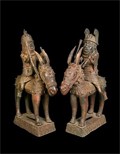
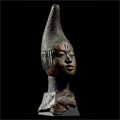
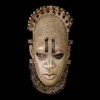
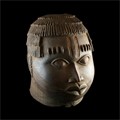

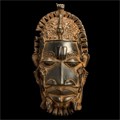
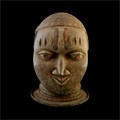
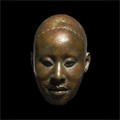
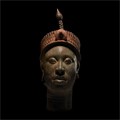
Three exhibitions on the history, culture and traditions of the Benin Kingdom were held on Saturday 7th July 2012, Friday 12th October 2012 and Saturday 13th October 2012. On each of these occasions, archive Photographs of the Ancient Benin Kingdom, the ‘1897 Conflict’ and Edo State today were exhibited alongside Benin artefacts.
At the first exhibition, a visiting Professor from the University of Benin (Professor C.O. Idehen) gave an in-depth presentation on the Ancient Kingdom of Benin, the ‘1897 Conflict’, the British Colonial Administration and the modern Edo State in Nigeria. The presentation was followed by a lively ‘Questions & Answers’ session.
DVD Films of the Coronation of the current ‘Oba of Benin’ and the BBC 3 TV Documentary Series on the ‘Ancient Benin Kingdom’ in the series titled “The Lost Kingdoms of Africa” were screened. Traditional Costumes worn by females from Edo State were also exhibited. Professor C.O. Idehen also provided us with 30 exclusive archive photographs from the ‘Royal Palace of the Oba’ which included pictures of the ‘Oba Ovonramwen’ being surrounded by some British Officials prior to his exile to Calabar where he remained for 17 years before he died and Oba Akenzua meeting Queen Elizabeth in 1956. Other pictures included the current ‘Oba’, Benin Royal Family Members, Benin Chiefs, Palace Officials, Benin Artefacts and Historical Buildings.
Below each of the 100 Photographs that were exhibited at all 3 events there was a summary explaining each of the photographs. The 2nd and 3rd Exhibitions were planned to take place during ‘Black History Month’ and had prominent Benin Historians and Community Figures who gave speeches and presentations on the ‘Governance and Administration in Ancient Benin Kingdom, the ‘Benin Kingdom/British Conflict 1897’, the British Colonial Administration and the Modern-Day Edo State. The exhibition on the 13th of October 2012 was attended by one of the members of the Benin Royal Family, Engr Bernard Woghiren (The UK Represenative of the ‘Oba of Benin’.), Dr. Taiwo Idemudia (Phd, JP), Councillor Joy Laguda (OBE), Councillor Charity Fiberesima, other Newham Councillors and the publisher of the ‘Ambassador Magazine’. Cultural Dancing, Singing and Drama were performed to showcase and depict the rich cultural heritage of the Benin Kingdom.
Educational trip to the British Museum.
Two Coach Trips to the British Museum (‘Sainsbury’s African Gallery) took place on Saturday 23rd June 2012 and Saturday 30th June 2012. The two coach trips were attended by 126 people including 20 volunteers. As well as a tour of the British Museum (‘Sainsbury’s African Gallery), all of the participants had a chance to view the famous collections of Benin Artefacts and take part in a Seminar and Workshops that were delivered by the Curators Team (Sainsbury’s African Gallery).
Participation in the Seminar and Workshops enabled the volunteers and project staff to collate information to assist them with their research. The Curators Team delivered a Seminar and small Workshops that covered the ‘Ancient Benin Kingdom’. During the Seminar, some of the participants (who had studied the history of the ‘Ancient Benin Kingdom’) pointed out corrections that needed to be amended in some of the information provided by the British Museum. For example, the dates, frequency, spelling, and names of the ‘Ague’ & ‘Igue’ Festivals. Also, the historical links that exist between the ‘Yoruba’ people and the people of ‘Benin Kingdom’.
For example, the eldest son (Ekaladeran), of an ‘Oba of Benin’ migrated to the present day ‘Oyo State’ (a place called ‘Ile-Efe’ ), which is in South Western Nigeria. Benin Oral History reveals that Ekaladeran, later was made the King of ‘II-Ife’. The eldest son of Ekaladeran, was made the ‘Oba of Benin’.
During the 3 Exhibitions that were organised the Benin Trust provided us with DVD Films on the Coronation Ceremony of ‘Oba Erediauwa’, African Youth Organisation provided us with Benin Artefacts, Archive Photographs, Traditional Costumes and Benin Historians providing presentations on the cultural and symbolic relevance of what each of the Benin Artefacts being displayed represents. Volunteers have visited the British Library as part of their desk top research for contributing to the publication of the book.
Heritage workshops.
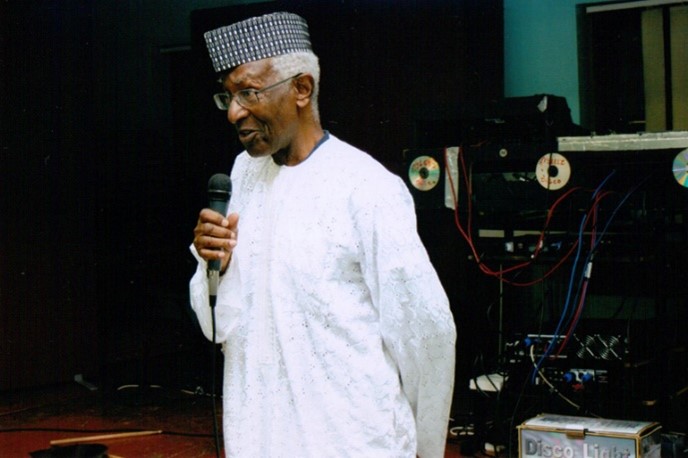
..
The UK Representative of the ‘Oba of Benin’
(Engr. Bernard Woghiren)
The ‘Curators Team’ of the British Museum organised Seminars and Workshops on the ‘Ancient Benin Kingdom’ on Saturday 23rd June 2012 & 30th June 2012. These Seminars and Workshops provided participants with historical, military, artistic and economic details about the Benin Empire. The Seminars & Workshops were presented with visual and archive materials.
During the tours of the British Museum (‘Sainsbury’s African Gallery’), the ‘Curators Team’, delivered workshops (participants were divided into small groups) on the Benin Artefacts on display and the methods of preservation used to safeguard these priceless items. Aston Mansfield (Community Involvement Unit) assisted us with the planning of the first Exhibition (Display Boards, Display Space Management, Presentation of the Archive Photographs, use of Equipment for hire and the layout of the venue).
Aston Mansfield also assisted us to organise and deliver a training programme for the volunteers. The volunteers participated in the following training sessions: ‘Induction & Customer Care’ (24/02/2012), ‘Health & Safety’ (16/03/2012), ‘Time Management’ (30/03/2012), ‘Safeguarding Children & Vulnerable Adults’ (24/04/2012) and ‘Team Working’ (11/05/2012). During the training session on ‘Team Working’ we covered ‘Events Promotion & Management which assisted us with the planning of the Exhibitions. Aston Mansfield also assisted us with the promotion of the first Exhibition that was held on Saturday 7th July 2012 and provided us with free use of some equipment items.
The UK Representative of the ‘Oba of Benin’ (Engr Bernard Woghiren) attended the Project Launch Event on the 29th of October 2011 and the third exhibition held on the 13th of October 2012. The first exhibition (7th July 2012) was attended by Representatives of the ‘Benin Union’ (Mr. Igue Edo and Mr. Idahosa) and the ‘Benin Communities in London Organisation’ (Mr. Peter Avan). In addition to the 3 exhibitions, with the assistance of the Curators Team of the British Museum, a private tour of the ‘Sainsbury’s African Gallery’ was organised for HRH Prince Edun Akenzua (the brother of the ‘Oba of Benin’) who was on a private visit to London. The private tour took place at 2pm on the 25th of September 2012 for a duration of one hour. HRH Prince Edun Akenzua was accompanied by the Curators Team of the ‘Sainsbury’s African Gallery’, Engr Bernard Woghiren, Ms. Efe Akenzua (daughter of HRH Prince Edun Akenzua), Councillor Joy Laguda (OBE), Dr. David Obaze, Mr. Stephen Obarise (prominent Benin Businessman), including Vincent John and David Idiabana (Chairman and General Manager of NACRC respectively, plus Project Staff, Dr. Samuel Egharevba, and Dennis Mensah).
There was a wide age range of participants in attendance (aged 11 to 80 years old) from different communities living in Newham and other London Boroughs.
Private tour by HRH Prince Edun Akenzua.
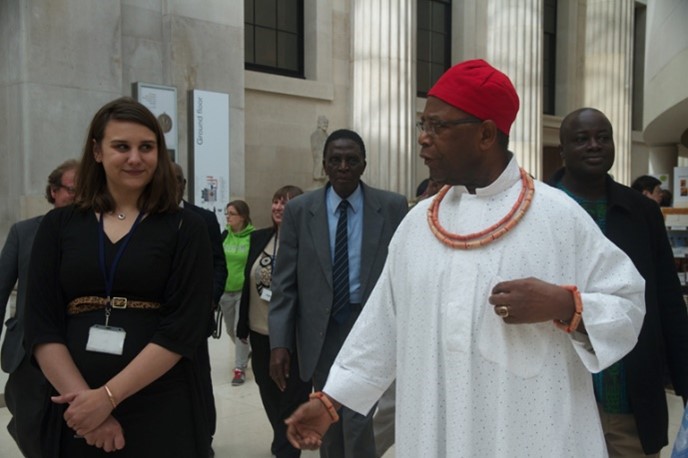
HRH Prince Edun Akenzua accompanied
by the Curators Team
In addition to these 2 Coach Trips, we also organised a private tour of the British Museum (Sainsbury’s African Gallery) on the 25th of September 2012 for HRH Prince Edun Akenzua, who was on a private visit to London.
He was accompanied on this private tour by a delegation consisting of Ms. Efe Akenzua (his daughter), Engr Bernard Woghiren (UK Representative of the ‘Oba of Benin), Councillor Joy Laguda (OBE), Dr. David Obaze, Stephen Obarise, Mr. David Idiabana, General Manager, and Mr Vincent John, Chairman (Newham African Caribbean Resource Centre). Twenty people participated in the private tour. All the 3 tours of the British Museum (Sainsbury’s African Gallery) provided the participants with the opportunity to view the famous collection of ‘Benin Artefacts’ and other collections from West Africa (e.g. Textile Materials, Ceremonial Stools & Swords of Paramount Chiefs etc.).
The participants also had the opportunity to view ‘Benin Brass Plaques (from the world famous Igun Street), the ‘Iyoba Queen Mother’s Head’, a DVD Film on ‘Brass Casting’ (Igun Street), Maps of the ‘Ancient Benin Kingdom’, Benin Masks (‘Ekpo’), Coral Beads and Regalia of the current ‘Oba of Benin’, ‘Oba Erediauwa’, photographs of ‘Oba Erediauwa’ and Carvings. The British Museum designed a small handbook that was used for the workshops during the tours of the Sainsbury’s African Gallery. The contents of the small handbooks were designed specifically to be used as a learning resource to educate participants on the history of the ‘Ancient Benin Kingdom, the 1897 Conflict and the Benin Artefacts that is displayed at the British Museum..
Media workshops – Media training with Suleiman Garcia
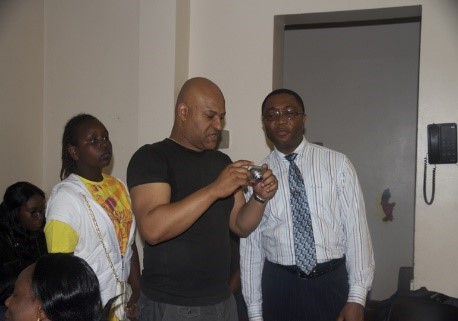
Two Media Workshops were organised for volunteers on interviewing skills and camera techniques.
The ‘Media Workshops took place on Wednesday 27th June 2012 and Thursday 28th June 2012.
Both workshops were delivered by Superior Television & Radio (SRTV), the organisation that produced the DVD film of the project.
The DVD film that has been produced has more than 5 interviews with Benin community leaders, Historians and features a prominent member of the Benin Royal Family.
Exhibitions and end of project celebration.
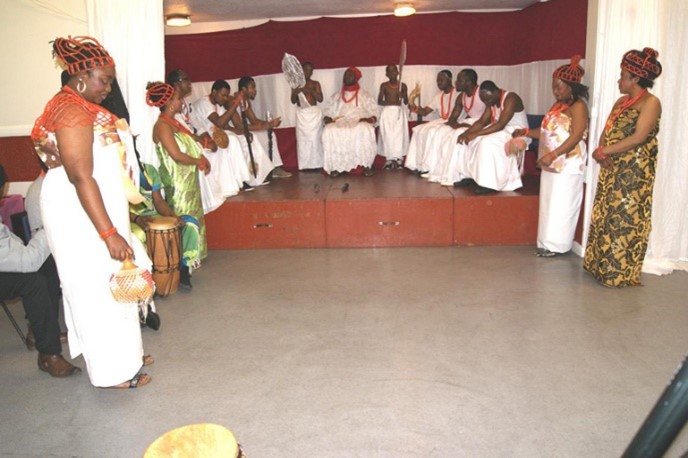
Three exhibitions were held on Saturday 7th July 2012, Friday 12th & Saturday 13th October 2012. The first exhibition held on the 7th of July 2012 took place at the Durning Hall Community Centre, Earlham Grove, Forest Gate, London E7 9EB.
The 2 Exhibitions that were held on the 12th & 13th October 2012 took place at the Newham African Caribbean Resource Centre, 627- 633 Barking Road, Plaistow, London E13 9EZ. Archive photographs of Ancient Benin Kingdom (the ‘1897 Conflict’ and post ‘1897’ period), Traditional Costumes were displayed at all 3 exhibitions.
Loaned Benin Heritage items (Benin Artefacts and Art Works) were loaned from local Benin organisations and displayed at all of the Exhibitions. An ‘End of Project Event’ took place on Saturday 21st December 2012 to launch the publication of the book and the DVD Documentary that was produced. This event was attended by about 280 people.
Production of website, 1,000 books and 1,000 DVD documentary.
A new website has been produced with ongoing updates and the handbook has also been completed. The DVD Documentary has also been edited and completed by Superior Radio & Television (SRTV). Both the DVD Documentary and the Book were launched at the ‘End of Project’ Event, which was held on Friday 21st December 2012.
The Books & DVDs will be distributed to local libraries, the British Museum, Heritage Organisations, Schools, Colleges, Community Centres, Nigerian High Commission, and other Embassies.
Project evaluation
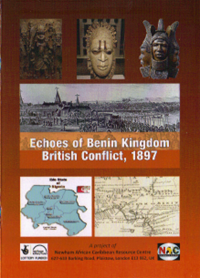
The book of the project
Evaluation has been ongoing through regular review meetings with the steering committee, project staff and with project volunteers. This has led to improvement in the design and general set up and content of the website, which now contain more information than it did initially; also, improvement in the way the project was advertised, as volunteers were then able to distribute leaflets more widely; use word of mouth to talk to people, used their individual mailshots to inform their circle of influence, etc.
Discussion from meetings also informed the content and format of the DVD, the design, the format /colour of the DVD packaging inlay and so on. Other improvements from the evaluation included the content of exhibition materials, as we had more in subsequent exhibitions than the previous one. It also impacted on the content and variety of the entertainment package during the exhibitions to attract a wider demographic. This helped to bring varied age groups into the exhibition, as attendance varied from children aged 5 years up to adults aged over 85 years old. There was also a mix of cultural backgrounds ranging from African, Caribbean, Asians, and Whites.
One of the downsides from our evaluation is that some participants, especially those from Benin felt that the project did not go far enough to address issues regarding the return of the artefacts, although we made it clear that the project was about preserving heritage, learning and participation and not the return of the artefacts. Secondly, as the project did not involve travelling to Benin, it was not possible to have direct input from some of the families that might have been affected; it was also not possible to have a direct interview with the present King and members of his cabinet.
Aims & Objectives
Volunteer Activities
This project relied upon the input from all volunteers working together to produce research material that would be shared between everyone. Participation in training courses, exhibitions and attending visits were all a part of individual development.
To encourage all volunteers to submit stories, poems, artwork, photographs, or anything else that may become a useful source of information for others involved within the project.
Our intention is to develop this page into a forum by which you can communicate with others on the project, to the wider community, and a space to display any work they have gathered. Also to showcase the talent we have amongst us as writers, artists, photographers, and organisers.
We shall not limit your sources of information to just images and text, we would like to also see video footage or animations that you have created, so that we can get a different perspective of displaying media to realise your potential.
To improve your research capabilities by preparing for every eventuality by following a few golden rules of media production:
- If you can, bring a digital camera with you to all the events you attend, as this will enable you to capture a moment that no-one else may have spotted.
- Bring a notebook and pen to jot down areas of interest and record your movements to create atmosphere and depth to your stories.
Events
Project Launch – 29 October 2011
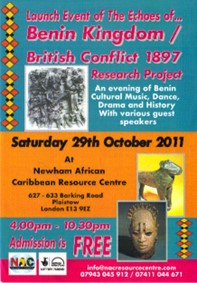
The project was formally launched on the 29th of October 2011 to coincide with ‘Black History Month’ (in the United Kingdom) at the Newham African Caribbean Resource Centre in Plaistow, East London. It was attended by more than 250 people from diverse ethnic communities including those from Edo State. This included prominent Benin Historians, Local Councillors of Newham Council and the VIP Guest Speaker Engr. Bernard Woghiren, the UK Representative of the ‘Oba’.
There were also representatives from some of the main partner organisations, Benin Union Trust, and Voice of Africa Radio Station. An article published in the Newham Recorder Newspaper assisted in the recruitment of over 30 Volunteers.
Gallery
Below is a collection of the photographs taken at the launch.
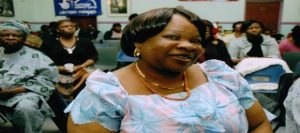
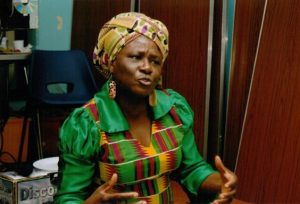
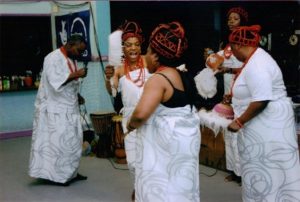
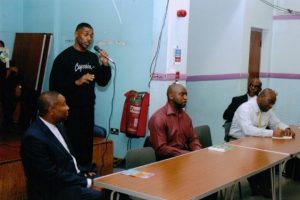
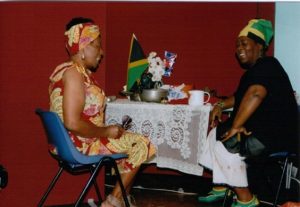
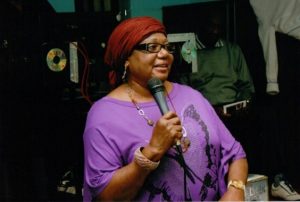
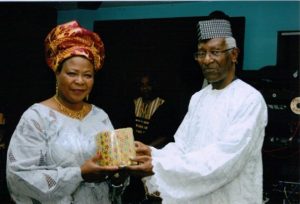
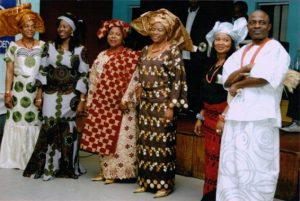
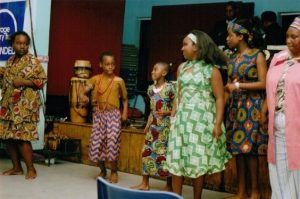
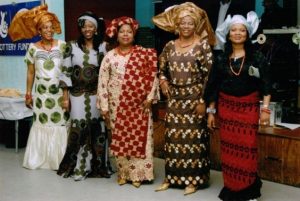
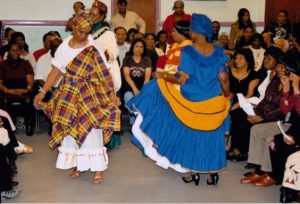
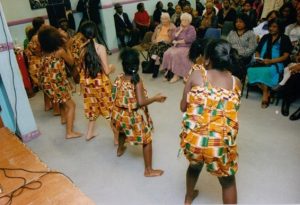
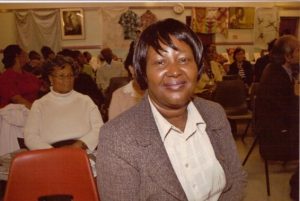
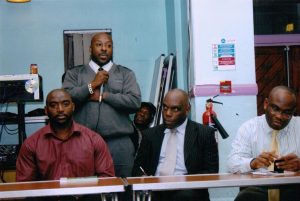
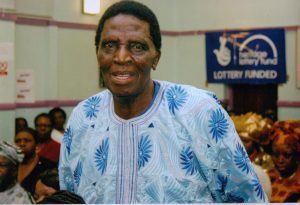
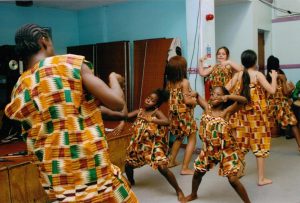
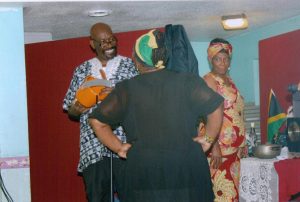
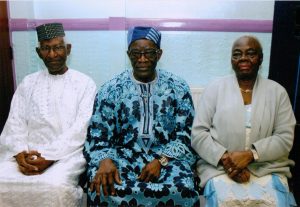
Private tour by HRH Prince Edun Akenzua.
Events
The House of Commons Launch – 30 January 2012
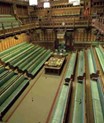
The official launch of the ‘Echoes of Benin kingdom/British conflict 1897’ and the introduction of the volunteers to the project took place at the House of commons (The Jubilee Room) on Monday 30th January 2012.
The event attended by a delegation of 50 people (30 volunteers) and others consisting of project staff, partner organisations (British museum, Aston-Mansfield, Benin union trust, the African youth organisation and REIN). Members of NACRC management committee and councillor Joy Laguda from Newham council were also in attendance.
The event hosted by Lyn Brown (MP for West Ham) included a guided tour of the House of Commons and the House of Lords.
Image gallery of the House of Commons Launch – 30 January 2012
Below are photographs of volunteers, representatives of partner organisations, project staff, the Chairperson and the General Manager of the NACRC.
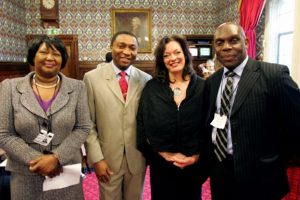
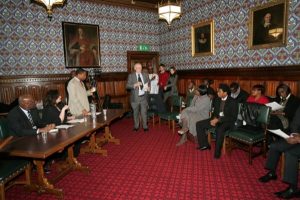
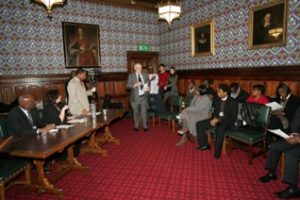
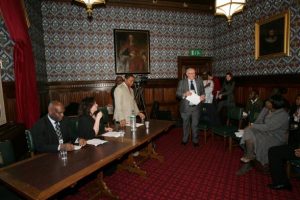
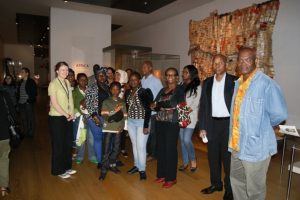
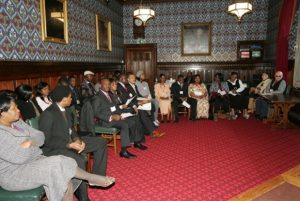
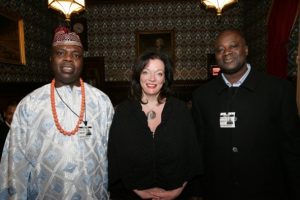
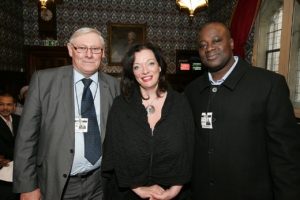
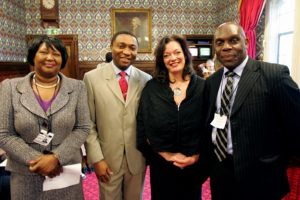
British Museum Visits – 23 June & 30 June 2012
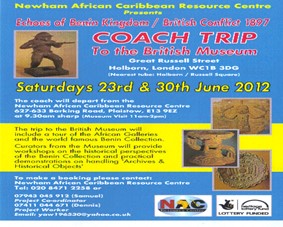
- Saturday 23rd June 2012.
- Saturday 30th June 2012.
The two trips to the British Museum were attended by 126 people reflecting the diverse residents from Newham and its environs. The ages of the attendees ranged between 8 and 70. The focus of the trips was the famous ‘Benin Artefacts and Archives Collection’. This included guided tours of the ‘African Galleries’, led by the Curators of the African Section.
The Curators delivered a seminar on the ‘Ancient Benin Kingdom’ and facilitated lively ‘Question & Answers’ debates on this topic. They also designed workshops for the participants to work in small groups during the tours.
Professor C.O. Idehen (Director of General Studies, University of Benin, Nigeria) attended the second of these trips. After the tour he gave a short presentation (approx 15 minutes) to the attendees and Curators.
British Museum Visits – 23 & 30 June 2012. (Sainsbury’s African Gallery) – Below is a collection of photographs of the trips.
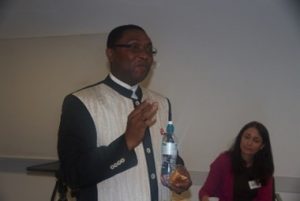
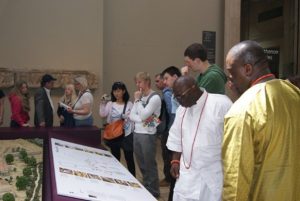
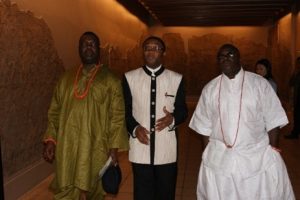
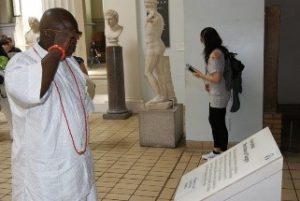
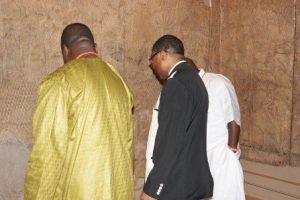
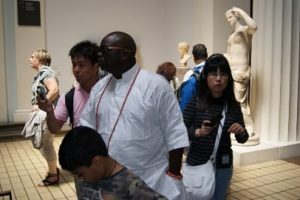
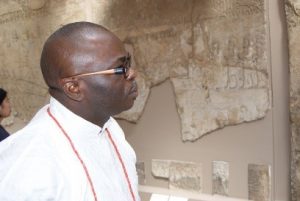
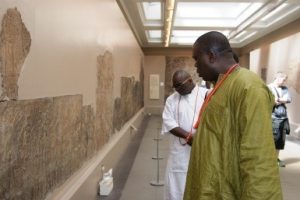
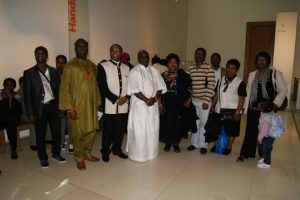
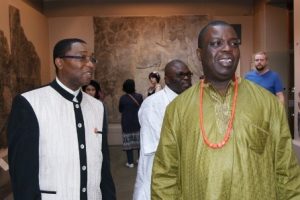
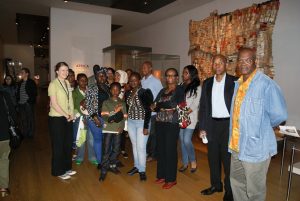
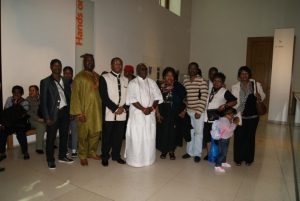
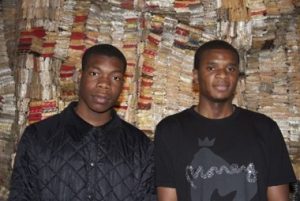
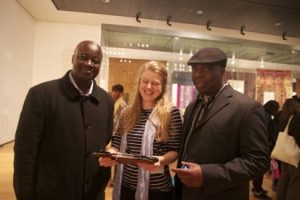
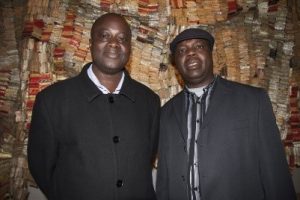
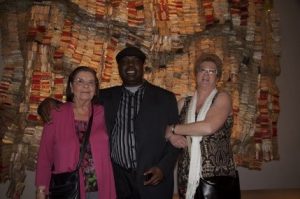
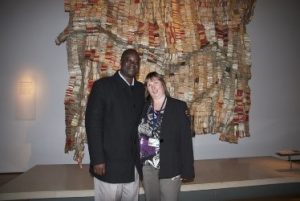
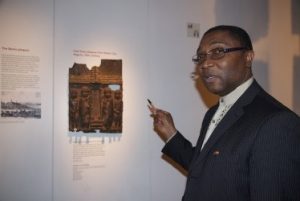
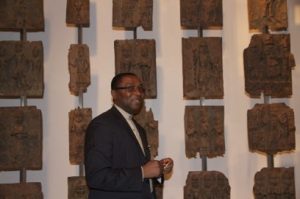
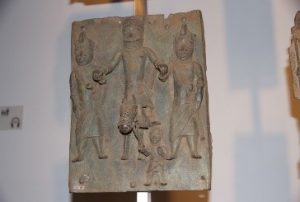
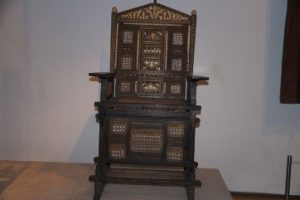
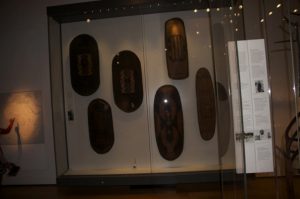
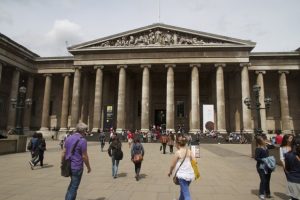
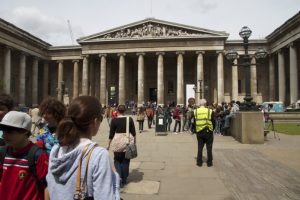
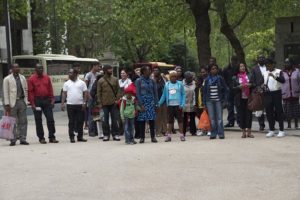
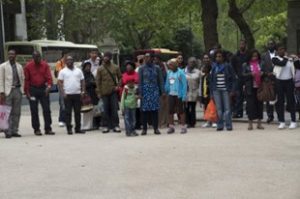
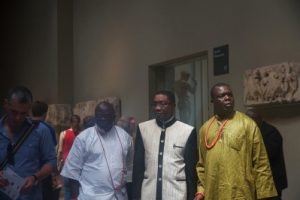
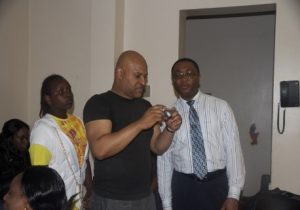
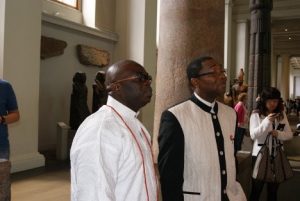
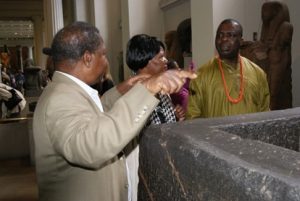
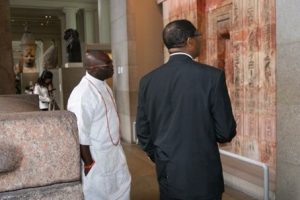
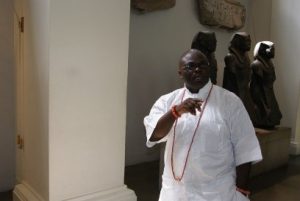
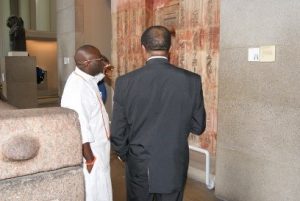
Image Gallery: British Museum Visit – 25 September 2012. (Sainsbury’s African Gallery)
Below is a collection of photographs taken of the private tour at the British Museum (Sainsbury’s African Gallery) on the 25th of September 2012 with HRH Prince Edun Akenzua, who was on a private visit to London.
He was accompanied by a delegation consisting of Ms. Efe Akenzua (his daughter), Engr. Bernard Woghiren (UK Representative of the ‘Oba of Benin), Councillor Joy Laguda (MBE), Dr. David Obaze, Stephen Obarise, Mr. David Idiabana, General Manager, and Mr Vincent John, Chairman (Newham African Caribbean Resource Centre).
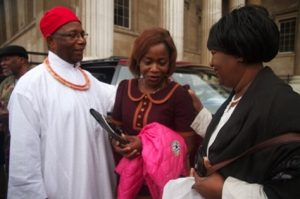

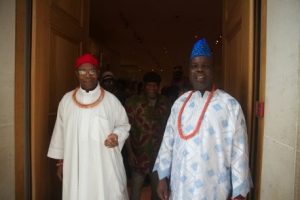
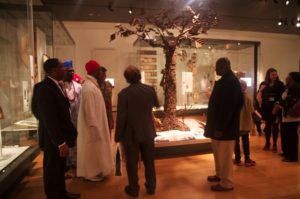
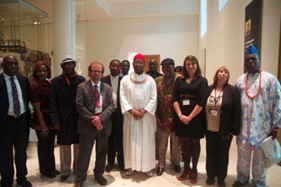
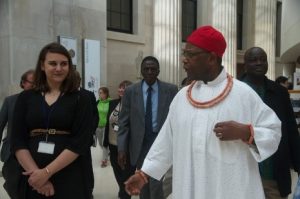
AFRICAN DANCE
Day and time: Thursday 10am – 11am
Suitable for: Over 50s
Cost: Free
AFRICaNISTIC MOVEMENT for over 50’s
Day and time: Monday 12pm – 1pm
Suitable for: Over 50s
Cost: Small fee
PROSTRATE AWARENESS CLINIC
Day and time: Monday 2pm – 7pm
Suitable for: Adults
Cost: Free
Deborah Day Dance Class
Day and time: Saturday 10am – 12pm
Suitable for: All ages
Cost: Small charge
PROSTRATE AWARENESS CLINIC
Day and time: Tuesday 2pm – 7.30pm
Suitable for: Adults
Cost: Free
Social Night/Recreation
Day and time: Fridays: 2pm – 11.30pm
Suitable for: Adults
Cost: Free
Our yearly impact & contributions to black history month
Influencing the way people, organisations, and movements think and act.
Earlier Events
Our networking partners



What are the aims of this project?
The project’s aim was to research the historical perspectives of the Benin / British conflict, noting its impact on its present-day socio – cultural dimensions. The research culminated in the production of resource materials in the form of DVDs, booklet and a website.
